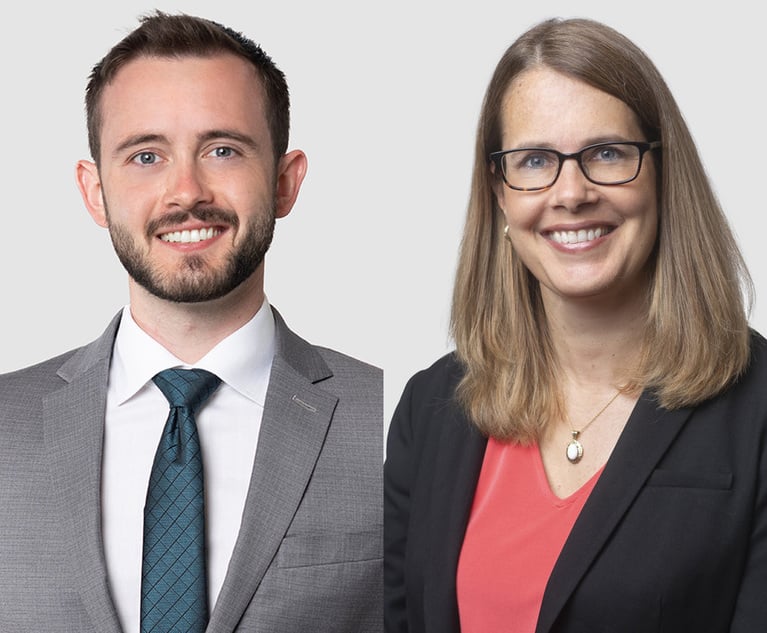Is Medical Marijuana Use Becoming a Protected Class Under State Laws?
Few topics these days are blazing as brightly as the issue of medical marijuana. In April 2016, Pennsylvania became the 24th state to legalize the use of marijuana for medicinal purposes. Used to treat an enumerated list of "serious medical conditions" including epilepsy, multiple sclerosis and cancer, Pennsylvania lawmakers have emphasized the scientific research supporting the improvements made in patients suffering extreme and debilitating symptoms.
June 22, 2017 at 02:06 PM
6 minute read
Few topics these days are blazing as brightly as the issue of medical marijuana. In April 2016, Pennsylvania became the 24th state to legalize the use of marijuana for medicinal purposes. Used to treat an enumerated list of “serious medical conditions” including epilepsy, multiple sclerosis and cancer, Pennsylvania lawmakers have emphasized the scientific research supporting the improvements made in patients suffering extreme and debilitating symptoms.
Aside from the documented health benefits, and after the state of Colorado raked in a total of $8.76 million in medical marijuana tax revenue in a single year ($200 million total when including tax revenue from the state's reported $1 billion in recreational marijuana sales), it is easy to see the appeal of Pennsylvania's relatively new medical marijuana legislation, known as “Act 16 of 2016.” This past Tuesday, June 20, Pennsylvania state Sen. Daylin Leach announced the award of permits to 12 applicants permitting the cultivation and processing of medical marijuana as “a huge day for patients and for the people of Pennsylvania.” After six months, so long as the growers can demonstrate that their facilities are operational, they may proceed to grow medical marijuana. Yes, Pennsylvanians, legalized pot is (finally) here.
The question for employers throughout the commonwealth will be how to draft and implement policies affecting employees who use cannabis for medicinal purposes. In the workplace, states that have legalized the use of medical marijuana are divided into two categories: states where employers have a duty to accommodate and states where the relevant laws are either silent or expressly exempt employers from providing accommodations to medical marijuana users.
This content has been archived. It is available through our partners, LexisNexis® and Bloomberg Law.
To view this content, please continue to their sites.
Not a Lexis Subscriber?
Subscribe Now
Not a Bloomberg Law Subscriber?
Subscribe Now
NOT FOR REPRINT
© 2025 ALM Global, LLC, All Rights Reserved. Request academic re-use from www.copyright.com. All other uses, submit a request to [email protected]. For more information visit Asset & Logo Licensing.
You Might Like
View All

Judge Tanks Prevailing Pittsburgh Attorneys' $2.45M Fee Request to $250K
5 minute read
Employment Law Developments to Expect From the Second Trump Administration
8 minute read
Dispute Over Failure to Accommodate Disability Ends in $900K Settlement
3 minute readTrending Stories
- 1Judge Extends Tom Girardi's Time in Prison Medical Facility to Feb. 20
- 2Supreme Court Denies Trump's Request to Pause Pending Environmental Cases
- 3‘Blitzkrieg of Lawlessness’: Environmental Lawyers Decry EPA Spending Freeze
- 4Litera Acquires Workflow Management Provider Peppermint Technology
- 5'I Can't Do This': Judge Blocks $16M Alex Jones Settlement
Who Got The Work
J. Brugh Lower of Gibbons has entered an appearance for industrial equipment supplier Devco Corporation in a pending trademark infringement lawsuit. The suit, accusing the defendant of selling knock-off Graco products, was filed Dec. 18 in New Jersey District Court by Rivkin Radler on behalf of Graco Inc. and Graco Minnesota. The case, assigned to U.S. District Judge Zahid N. Quraishi, is 3:24-cv-11294, Graco Inc. et al v. Devco Corporation.
Who Got The Work
Rebecca Maller-Stein and Kent A. Yalowitz of Arnold & Porter Kaye Scholer have entered their appearances for Hanaco Venture Capital and its executives, Lior Prosor and David Frankel, in a pending securities lawsuit. The action, filed on Dec. 24 in New York Southern District Court by Zell, Aron & Co. on behalf of Goldeneye Advisors, accuses the defendants of negligently and fraudulently managing the plaintiff's $1 million investment. The case, assigned to U.S. District Judge Vernon S. Broderick, is 1:24-cv-09918, Goldeneye Advisors, LLC v. Hanaco Venture Capital, Ltd. et al.
Who Got The Work
Attorneys from A&O Shearman has stepped in as defense counsel for Toronto-Dominion Bank and other defendants in a pending securities class action. The suit, filed Dec. 11 in New York Southern District Court by Bleichmar Fonti & Auld, accuses the defendants of concealing the bank's 'pervasive' deficiencies in regards to its compliance with the Bank Secrecy Act and the quality of its anti-money laundering controls. The case, assigned to U.S. District Judge Arun Subramanian, is 1:24-cv-09445, Gonzalez v. The Toronto-Dominion Bank et al.
Who Got The Work
Crown Castle International, a Pennsylvania company providing shared communications infrastructure, has turned to Luke D. Wolf of Gordon Rees Scully Mansukhani to fend off a pending breach-of-contract lawsuit. The court action, filed Nov. 25 in Michigan Eastern District Court by Hooper Hathaway PC on behalf of The Town Residences LLC, accuses Crown Castle of failing to transfer approximately $30,000 in utility payments from T-Mobile in breach of a roof-top lease and assignment agreement. The case, assigned to U.S. District Judge Susan K. Declercq, is 2:24-cv-13131, The Town Residences LLC v. T-Mobile US, Inc. et al.
Who Got The Work
Wilfred P. Coronato and Daniel M. Schwartz of McCarter & English have stepped in as defense counsel to Electrolux Home Products Inc. in a pending product liability lawsuit. The court action, filed Nov. 26 in New York Eastern District Court by Poulos Lopiccolo PC and Nagel Rice LLP on behalf of David Stern, alleges that the defendant's refrigerators’ drawers and shelving repeatedly break and fall apart within months after purchase. The case, assigned to U.S. District Judge Joan M. Azrack, is 2:24-cv-08204, Stern v. Electrolux Home Products, Inc.
Featured Firms
Law Offices of Gary Martin Hays & Associates, P.C.
(470) 294-1674
Law Offices of Mark E. Salomone
(857) 444-6468
Smith & Hassler
(713) 739-1250





